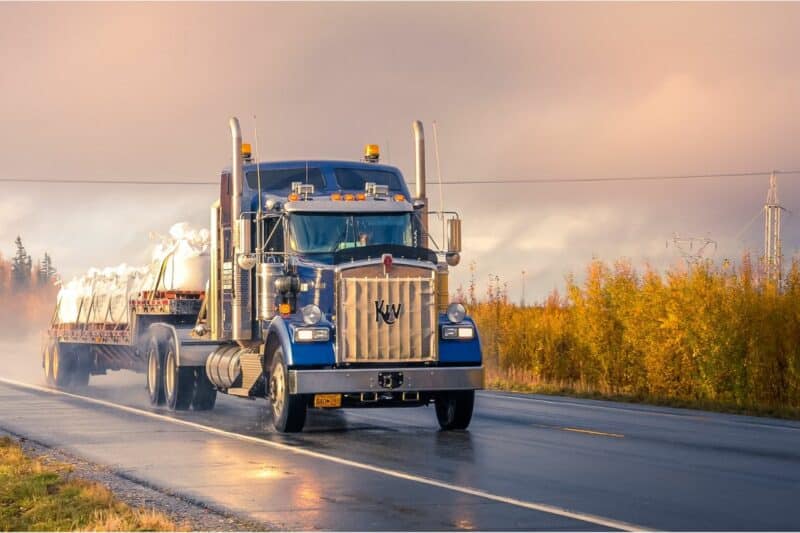Getting into the trucking industry can be difficult — especially if you don’t know where to start. That’s why we’ve put together this guide on how to start a trucking company.
We’ll walk you through everything you need to do, from creating a business plan to getting the proper licenses and permits. So, if you’re ready to get your business on the road, keep on reading.
Step 1: Create a Business Plan
Trucking is a special kind of business. It’s not like starting a restaurant where you need a certain amount of square footage or starting a clothing store where you need to be in close proximity to other retail shops.
When it comes to starting a trucking company, your biggest overhead costs will be the trucks and the wages of drivers who operate them.
For example, you’ll have to pay about $150,000 for a new, or $100,000 for a used high-end semi-truck, whereas low-end trucks cost about $99,000 (new) and $35,000 (used). Hiring a truck driver will cost you from $2,000 to $15,000.
On that note, you need to decide what kind of trucking company you want to operate. There are three main types of trucking companies:
- long-haul, which involves shipping cargo across the country
- regional, which ship goods within a specific area
- local, which deliver goods within a city or town
Before opening a trucking company, you’ll also need to think about what kind of freight you want to haul. There are four main types of freight:
- full truckload (FTL), which involves shipping large loads that fill an entire trailer
- less than truckload (LTL), which involves shipping smaller loads that take up less space in the trailer
- intermodal, which involves shipping containers that can be transported by multiple modes of transportation (e.g., rail, ship, and truck)
- specialty, which involves hauling hazardous materials or oversized loads.
Once you’ve decided on the type of trucking company you want to operate and the freight you want to haul, you can start creating your trucking business plan.
Your business plan should include your company’s mission statement, an overview of your operating procedures, and financial goals.
Step 2: Register Your Business
After you’ve created your business plan, you’ll need to register your company with the state where you plan to operate.
You’ll also need to choose a business entity type (limited liability corporation, C-corp, S Corp, etc.) and choose a business name.
Once you’ve registered your business and chosen a name, you can start applying for your DOT (Department of Transportation) number.
Step 3: Get the Proper Licenses and Permits
Before starting a trucking business, you’ll need to obtain the proper licenses and permits from the federal, state, and local governments.
At the federal level, you’ll need to get an MC number and a USDOT number from the Federal Motor Carrier Safety Administration (FMCSA).
At the state level, you’ll need to register your trucking company with the state in which you plan to operate.
Each state has different requirements for registering a trucking company, so you’ll need to check with your state’s DMV or Secretary of State office to find out what’s required.
For example, to start a trucking company in California, you need to obtain a CDL, apply for a federal DOT number, complete your UCR, and get an IRP tag.
Step 4: Purchase the Trucks
Starting a hauling business is not cheap – you will need to factor the cost of purchasing trucks and equipment into your business plan.
The price of a truck will significantly depend on the make, model, and age. Generally, high-end semi-truck cost between $150,000 and $200,000. The most expensive semi-truck model is Tesla ($150,000-$200,000), while Kenworth has the lowest base price ($75,000).
Furthermore, sleeper cabs are more expensive than day cabs. For example, depending on the size and amenities, a new sleeper semi-truck will set you back between $200,000 and $300,000.
You can buy either new trucks or used trucks. When choosing trucks, select the ones that are reliable and fuel-efficient.
You’ll also want to make sure that your trucks are equipped with the latest safety features, such as forward collision warning and mitigation systems, driver alert systems, ESC, trailer sway control, lane assist, and blind-spot monitoring.
In addition to that, you’ll need to install driver tracking systems to track your drivers.
Step 5: Hire Qualified Drivers
One of the most important steps to starting a trucking business is hiring qualified drivers. On that note, don’t forget to conduct thorough background checks on all potential employees.
You should also provide training for your drivers on things like defensive driving and DOT regulations.
Step 6: Obtain Insurance
You’ll need to purchase liability insurance, as well as cargo and Bobtail insurance. You may also want to consider purchasing other types of insurance, such as workers’ compensation and collision coverage.
The cost of insurance will vary depending on the coverage you select.
Step7: Secure Startup Funding
Last but not least, you’ll need to secure funding for your new trucking company. If you don’t have the necessary funds on hand, you may need to apply for a small business loan or look into other financing options, such as freight factoring. Freight factoring is the process of taking invoices and obtaining immediate payment instead of waiting 30, 60, or even 90 days for a payment to come through.
Alternatively, even crowdfunding sites could help you realize your dream.
Starting a Trucking Business for Dummies: The Dos and Don’ts
Do:
- Research the trucking industry and your competition
- Create a business plan that includes costs, marketing strategy, and financial projections
- Choose the right trucking company name and logo
- Obtain the necessary permits and licenses for your trucking business
- Hire qualified truck drivers
- Invest in a good dispatch software system
Don’t:
- Start your trucking company without doing any research
- Incorporate your trucking company without first consulting with an attorney
- Hire truck drivers without first conducting background checks and drug tests
Conclusion
Now that you know how to start your own trucking company, before you hit the open road, make sure to keep up with regular maintenance on your trucks and trailers, always obey traffic laws, and stay up-to-date on industry news so you can stay ahead of the competition.
We hope that this guide has been helpful and provided some useful information for getting started in the trucking industry.
FAQs
How much cash do you need to start a trucking company?
To open a small trucking company (with one to two trucks), you’ll need to have $10,000–$20,000.
For a medium-sized trucking company (with three to five trucks), you’ll need $30,000–$50,000. And for a large trucking company (with six or more trucks), you’ll need $100,000 or more.
Of course, these are just estimates, and your actual costs may be more or less than these amounts.
Is starting a trucking company profitable?
The trucking industry is a lucrative business. For example, the United States freight trucking sector generated $732.3 billion in revenue in 2020, while the global freight trucking market is expected to reach $2.7 trillion by 2026.
How much money can you make with a trucking company?
On average, trucking companies have a 6%–8% profit margin. However, your earnings will depend on gas prices, tolls, drivers’ performance (such as consistency and punctuality), salaries, truck maintenance, and other unexpected repairs.
How long does it take to start a trucking company?
Once you’ve gathered all of your documents, you can receive your operating license within 20 days.
How do I start a trucking business with one truck?
You’ll need a business plan and some startup capital, but getting your trucking company off the ground with just one truck is possible.
First, you’ll need to find a niche for your trucking company. What type of freight do you want to haul? How do you want to differentiate your company from the competition?
Next, you’ll need to get your truck up to DOT compliance. This includes getting a DOT number, registering your vehicle, and obtaining insurance.
Once you’re compliant, it’s time to start marketing your trucking company. You’ll need to find shippers who need freight moved and then give them a quote.
Now that you know how to start a trucking company, keep track of your expenses and revenues so you can continue to grow your business.






